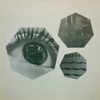[Type]
Sometimes in the course of Internet browsing I will happen upon a project that’s only available digitally and get a little bummed. As a firm devotee of physical formats who loses files all too easily, digital is just too frustratingly intangible for me, and even when it’s my only option I hesitate to click the buy button. One of the most intriguing digital projects I have ever found is Pye Corner Audio. Described on their website to be a transcription service wherein their nameless Head Technician has been transferring quarter-inch tapes since 1970. As luck would have it, soon after discovering this mysterious transcription service and having my interest firmly piqued, Further Records pressed the second volume of Pye Corner Audio’s Black Mill Tapes to cassette (and recently pressed volumes one and three as well). Even better, Type Records has seen fit to press the first two volumes on wax, and it’s a good thing that they did. Although the gimmick might be that these tracks were ripped from tape to digital, they clearly belong on analog formats. This review will focus solely on the Type vinyl version.
From the get-go it’s pretty clear that the Black Mill Tapes are most likely not a compilation of found quarter-inch spools, as the work is far too cohesive to be anything other than the work of one producer. It’s also a high-concept series, as Volume 3 was recently released and there is no indication of how many more volumes are planned. Throughout the series there are numbered “Transmissions,” numbered “Themes,” and numbered “Electronic Rhythms,” as well as a smattering of titled tracks, all which heighten the archival narrative of the records and lend a sense of unity to the whole series. The sounds are more than a little reminiscent of Boards of Canada, as it would be quite easy to mistake plenty of the tracks here for outtakes from avant-garde educational films from the 1970s. But whereas yours truly has never really warmed to Boards of Canada like most others, Pye Corner Audio uses these sounds with a clearer intent and focus.
There’s something vaguely sinister under the surface of the Black Mill Tapes, something that recalls idyllic locations with one too many bearded hippies in lab coats and locked rooms to feel completely at ease. While the record never exactly veers into horror soundtrack pastiche, it certainly sounds as if it could score some particularly unsettling acid trips. “We Have Visitors,” with its Italo-esque 16th-note bass line, retro-futurist keypads, and funky slap bass sure as hell sounds like a forgotten B-side from Goblin’s Deep Red, but it evokes the images of Argento’s films without flat-out aping the sound of that group or Ennio Morricone, as many have done before. “Electronic Rhythm Number Three” is another standout, slogging along with ancient rhythm machines at andante tempos while sounds steadily build atop low-slung bass lines. With a record this chock full of standout cuts it would be missing the point to go into each, but the highlight of both volumes is also the longest thing here: the magnificent “Toward Light.” Haunting, foggy pads mesh with a plodding bass line that, over the course of its eight minutes, gently eases up the scale, threatening total catharsis as it does.
“Toward Light” soon subsides into the same eerie, pseudo-hauntological sounds that are the signature of the Black Mill Tapes, and it’s moments like these that make this collection of recordings such a triumph. Yes, hauntology, retro-futurism, and Radiophonics have been all the rage the past couple of years, but the work of Pye Corner Audio is referencing a somewhat different era (early 70s) and seems to be constructed with a very novel ethos driving it. References to Giorgio Moroder and David Cain would not be misguided, but the Black Mill Tapes seem to digest and synthesize these sonic signatures into something wholly original. It’s some of the most visual music I’ve heard in some time; and while the images my brain produces during the transcription process from sound wave to brain wave might vastly differ from yours, I doubt the scenes will be any less evocative. Earlier this year I listened through both volumes while lying down, and, while drifting in and out of reveries, the music seemed almost perfectly in tune with my hypnagogic state, suggesting that the Black Mill Tapes are designed for just these kinds of lucid dreams. It’s just one of the many reasons why this is one of the most absorbing and unmissable collections you’re likely to stumble upon this year.
















[…] Audio has put out some of the best music of the year so far (or at least had it reissued) in the Black Mill Tapes Volumes 1, 2 and 3. For those who need further convincing, check this live set from earlier this year. Warm, […]